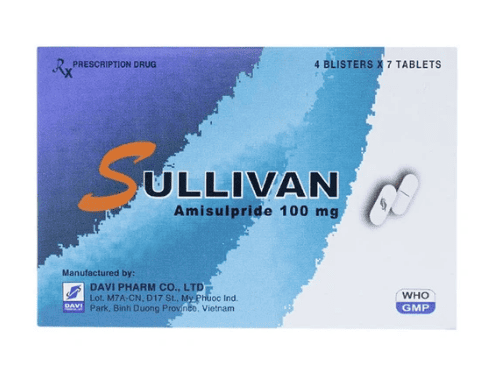This is an automatically translated article.
Sodilena medicine is made in the form of tablets, with the main ingredient being Amisulpride. The drug is used in the treatment of mental illnesses, especially schizophrenia.
1. What are the effects of Sodilena?
What is Sodilena? One Sodilena tablet contains 200mg of Amisulpride and other excipients. Amisulpride is a benzamides antipsychotic. Amisulpride is effective against psychosis.
Sodilena is indicated for the treatment of mental illnesses, typically acute and chronic schizophrenia. Patients may have symptoms (hallucinations, paranoia, thought disorders, ...) or no symptoms (no emotions, preferring isolation shock,...), including schools. The asymptomatic case predominates.
Contraindications to using Sodilena:
Patients with hypersensitivity or allergy to the drug's components; Several cases of severe hypertension have been reported in patients with pheochromocytoma taking anti-dopaminergic drugs (including some benzamides such as amisulpride). Therefore, the drug is not indicated for patients with confirmed or suspected pheochromocytoma; Children under 15 years of age (due to the lack of clinical data on the use of the drug in children under this age); Patients with known or suspected prolactin-dependent tumors (eg, pituitary adenoma, breast cancer); Use together with Levodopa; Patients with severe renal impairment (creatinine clearance less than 10ml/min); Pregnant women.
2. How to use and dose of Sodilena
The drug is used orally with the recommended dosage as follows:
With a dose of ≤ 400mg, it is used only once, with a dose of over 400mg, it is used twice; The maximum dose for the drug in the form of intramuscular injection is: 400mg/day; In the period when negative symptoms predominate: At a dose of 50-300mg/day, the dose should be adjusted individually. Optimal drug dosage in the range of 100mg/day; In the mixed phase (with both positive and negative symptoms): Initiate treatment with a dose to control positive symptoms, usually 400-800mg/day. The dose should then be adjusted according to the patient's response to achieve the minimum effective dose; In the period of acute psychotic episodes: Initiate treatment with an effective dose immediately upon initiation without dose titration. The recommended dose for oral form is 400-800mg/day, the maximum dose should not exceed 1200mg/day. Next, the dose is maintained or adjusted according to the patient's response. In all cases, the minimum effective dose should be found for the individual patient; Patients with renal impairment: Because Amisulpride is excreted by the kidneys, the dose for patients with renal failure should be reduced by 1⁄2 for patients with Clcr 30 - 60ml/min, reduced to 1⁄3 in patients with Clcr 10 - 60 ml. 30ml/min. There are currently no data on the use of Sodilena in patients with severe renal impairment with Clcr less than 10ml/min, so Amisulpride is contraindicated in this group of patients; Hepatic Impairment: Because Amisulpride is poorly metabolised in the liver, it is not necessary to reduce the dose in patients with hepatic impairment. To date, there are not many data on acute overdose with Amisulpride. The signs and symptoms noted are usually enhanced pharmacological effects, manifested specifically as lethargy, hypotension, coma and extrapyramidal syndrome.
There is currently no specific antidote for Amisulpride. In the event of acute poisoning, the patient should find out if there is any drug combination or not, and take appropriate emergency measures such as monitoring vital functions, monitoring electrocardiogram (QT segment). until the patient recovers. In case of severe extrapyramidal syndrome, the patient can be treated with anticholinergic drugs.
3. Side effects of the drug Sodilena
Some side effects patients may experience when using Sodilena include:
Common: Increased prolactin blood, usually reversible when stopping the drug. This condition can cause a number of clinical symptoms such as gynecomastia in men, increased lactation, impotence, breast engorgement, frigidity; Rare: Drowsiness; Gastrointestinal disturbances (dry mouth, nausea, vomiting, constipation) Very rare: Acute dystonia (eye rotation, torticollis, jaw tightness,...) may occur. These disturbances resolve when the patient is on anticholinergic fibrillation drugs. Therefore, there is no need to stop taking Amisulpride; Tardive dyskinesia characterized by involuntary movements of the tongue or face (particularly with prolonged use of the drug). In this case, the use of anticholinergic anti-paralysis drugs is not effective, even making the symptoms worse; Other symptoms: Hypotension, bradycardia, prolongation of the QT interval (very rarely causing torsade de pointes), allergic reactions, onset of convulsions, malignant syndrome.
4. Be careful when using Sodilena
Before and while taking Sodilena, patients should be aware:
Amisulpride can cause malignant syndrome (muscle stiffness, hyperthermia, loss of consciousness, autonomic disturbances, increased CPK - creatine phosphokinase, ...). In case of hyperthermia, especially when taking high doses for a long time, the patient should stop taking the drug immediately; Depending on the dose, Amisulpride can prolong the QT interval, predisposing to torsades de pointes arrhythmias. This effect will be enhanced if the patient has hypokalemia, bradycardia, congenital long QT or in combination with drugs that prolong the QT interval; Clinical cases allow, before appointing Amisulpride, patients should be checked to make sure that there are no factors that can cause arrhythmias such as: Hypokalemia; bradycardia less than 55 beats/min; congenital long QT interval; are taking drugs that can cause significant bradycardia (less than 55 beats/min), drugs that slow conduction in the heart, drugs that lower blood potassium, drugs that prolong the QT interval,...; EEG should be done before long-term treatment with neuroleptics; Neuroleptics can lower the seizure threshold, so caution and close monitoring should be exercised when amisulpride is used in patients with a history of epilepsy; Use caution when using Amisulpride for the elderly because this group of subjects is often highly sensitive to the drug; Neuroleptics should only be used in patients with Parkinson's disease when absolutely necessary.
5. Sodilena drug interactions
Some drug interactions of Sodilena include:
Sodilena should not be combined with Levodopa because there is a competitive antagonism between Levodopa and neuroleptics. In case of extrapyramidal syndrome caused by neuroleptics, levodopa should not be treated but an anticholinergic drug should be used. In patients with Parkinson's disease treated with levodopa, where additional neuroleptic agents are required, levodopa should not be continued because of the potential for aggravation of psychosis, and is ineffective because of the receptors. has been blocked by the effects of neuroleptics; Sodilena should not be combined with alcohol because alcohol enhances the sedative effect of neuroleptics. With impaired concentration and alertness, it can be dangerous to drive or operate machinery. You should avoid drinking alcohol or alcoholic beverages while taking Sodilena; Caution should be exercised when combining Sodilena with antihypertensive drugs because of the synergistic effect on lowering blood pressure, which may lead to orthostatic hypotension; Caution should be taken when combining Sodilena with other CNS depressants such as morphine analgesics and antitussives, sedative antidepressants, anxiolytics, and H1 antihistamines with sedative effects. psychotropic drugs, drugs in the group of barbiturates, clonidine, sleeping pills, methadone, thalidomide,... The reason is because this combination can increase central nervous system depression, reduce alertness, and can be dangerous when driving. or operate machinery. Using Sodilena exactly as recommended by your doctor is a prerequisite for effective disease treatment. Therefore, the patient should coordinate with all instructions and instructions of the doctor during the use of the drug.
Please dial HOTLINE for more information or register for an appointment HERE. Download MyVinmec app to make appointments faster and to manage your bookings easily.













